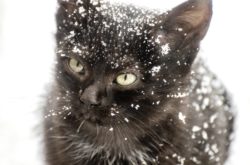With a significant portion of the United States experiencing cold snaps, bomb cyclones, and winter storms, don’t forget to think of the animals.
There are a few things to consider when dealing with animals during the winter season. A little preparation can go a long way in this dangerous weather.

According to the American Red Cross, the best solution is to bring your pets inside during a winter storm or cold weather. If you have a outdoor pet, ensure the animal has a warm sheltered area–not blocked by snow drifts–to stay in and make sure there is continued access to non-frozen drinking water. Although animal clothing may seem almost comical, some short-hair animals can benefit from the additional warmth.
“Many dogs enjoy walking outside in cold weather and playing in the snow,” said Dr. Erin Wilson, medical director of the American Society for the Prevention of Cruelty to Animals. “If dogs seem uncomfortable, then a sweater or jacket can be very helpful.” Wilson said.
Frostbite and Hypothermia
Like humans, animals can suffer long or short-term effects during or after exposure to cold weather.
“Pets are sensitive to severe cold and are at risk for frostbite during extreme cold snaps,” according to the Humane Society of the United States. “Exposed skin on noses, ears and paw pads can quickly freeze and suffer permanent damage.”
Pets are not exempt from the dangers of hypothermia, and according to the Pet Health Network, the symptoms of a cat or dog dealing with hypothermia includes shivering and weakness in mild cases. In more severe cases, pets can experience muscle stiffness, low blood pressure, slow and shallow breathing, or difficulty locating a heartbeat.
If an animal is showing signs of frostbite or hypothermia, you should contact your veterinarian immediately.
Helping stray animals stay alive
When thinking of helping the animals during a winter storm it’s only natural to think of your own beloved pet. However, there are thousands of stray animals that may need help as well.
Kristen Frank, a vet at the American Society for the Prevention of Cruelty to Animals, worries about domesticated stray animals, such as cats and dogs, during winter storms. “They’re not used to fending for themselves or surviving in that kind of environment,” said Frank.
If you see a stray animal struggling in the cold, the easiest solution will be to call your local animal control, which will pick up dogs, cats, or other animals as soon as possible. You can also make a small makeshift shelter out of a cardboard box and put out clean, non-frozen water for animals to drink.
More tips
The Humane Society of the United States has some specific additional tips for caring for pets during the winter months:
- If pets cannot come indoors, make sure they are protected by a dry, draft-free enclosure large enough to allow them to sit and lie down, but small enough to hold in the pet’s body heat. Raise the floor a few inches off the ground and cover it with cedar shavings or straw. Turn the enclosure away from the wind and cover the doorway with waterproof burlap or heavy plastic.
- Salt and other chemicals used to melt snow and ice can irritate a pet’s paws. Wipe their paws with a damp towel before your pet licks them and irritates their mouth.
- Antifreeze is a deadly poison. Wipe up spills and store antifreeze out of reach.
Winter storms can be scary for animals and humans alike, but if we take the necessary precautions, we can all have a happy, healthy, and fun winter season.
How do you keep your pets safe and warm in the cold weather?
Also by Olivia: Vegan Cream Of Mushroom Soup With White Wine & Almonds
What Every Animal Lover Should Know About Dog Food–And Better Alternatives
Get more like this—Subscribe to our daily inspirational newsletter for exclusive content!




